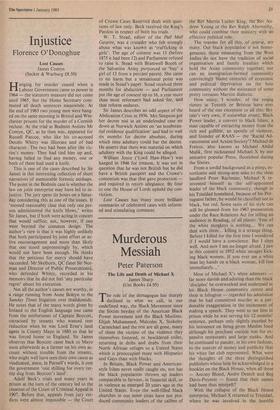Injustice
Florence O'Donoghue
Lost Causes James Comyn (Secker & Warburg £8.50) This is one of the cases described by Sir James in this interesting collection of short narratives of memorable forensic mishaps. The point in the Bodmin case is whether the law on joint enterprise may have led to in- justice. The jury spent six hours on a Satur- day considering this as one of the issues. It `seemed reasonably clear that only one per- son administered the knife blows,' writes Sir James, but if both were acting in concert that would suffice; not, however, if one went beyond the common design. The author's view is that it was highly unlikely that both participated by joint effort or ac- tive encouragement and more than likely that one stood unprotestingly by, which would not have been enough. He thinks that the petitions for mercy should have succeeded. Mr Skelhorn, QC (later Sir Nor- man and Director of Public Prosecutions), who defended Whitty, recorded in his memoirs that he did not feel 'any particular regret' about his execution.
Not all the author's causes are worthy, in a range running from Anne Boleyn to the Sunday Times litigation over thalidomide. He notes that of the many words given by Ireland to the English language one came from the misfortunes of Captain Boycott, ostracised by tenants who wanted rent reduction when he was Lord Erne's land agent in County Mayo in 1880 so that he was forced home to England. Sir James observes that Boycott came back to Mayo soon afterwards as a farmer on his own ac- count without trouble from the tenants, who might well have seen their own cause as vindicated, since, in Parnell's words, it cost the government 'one shilling for every tur- nip dug from Boycott's land'.
Adolf Beck's trials and many years in prison at the turn of the century led to the creation of the Court of Criminal Appeal in 1907. Before that, appeals from jury ver- dicts were almost impossible — the Court of Crown Cases Reserved dealt with ques- tions of law only. Beck received the King's Pardon in respect of both his trials.
W. T. Stead, editor of the Pall Mall Gazette, was a crusader who felt strongly about what was known as 'trafficking in girls'. The age of consent was 13 (before 1875 it had been 12) and Parliament refused to raise it. Stead with Bramwell Booth of the SalvatiOn Army purported to 'buy' a girl of 13 from a peccant parent. She came to no harm but a sensational point was made in Stead's paper. Stead received three months for abduction — and Parliament put the age of consent up to 16, a year more than most reformers had asked for, and that reform endures.
Sir James describes an odd aspect of the Abdication Crisis in 1936. Mrs Simpson got her decree nisi in an undefended case set down at Norwich Assizes on 'an insubstan- tial residence qualification' and had to wait six months for decree absolute, during which time adultery could bar the decree. He asserts that there was material on which adultery with the King could be alleged.
William Joyce (`Lord Haw-Haw') was hanged in 1946 for treason. It was not in question that he was not British but he did have a British passport and the Crown's contention was that that gave protection and required in return allegiance. By four to one the House of Lords upheld the con- viction.
Lost Causes has many more brilliant summaries of celebrated cases with inform- ed and stimulating comment.


































 Previous page
Previous page